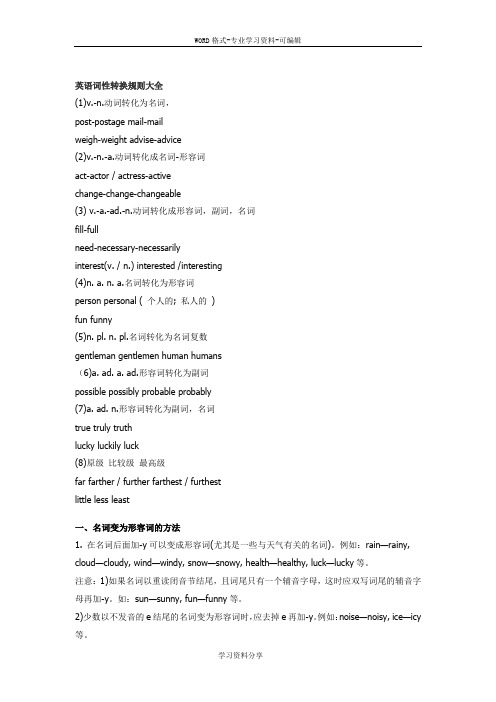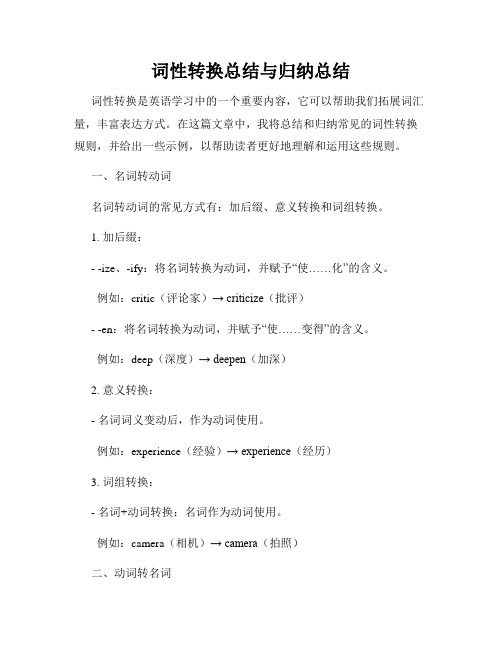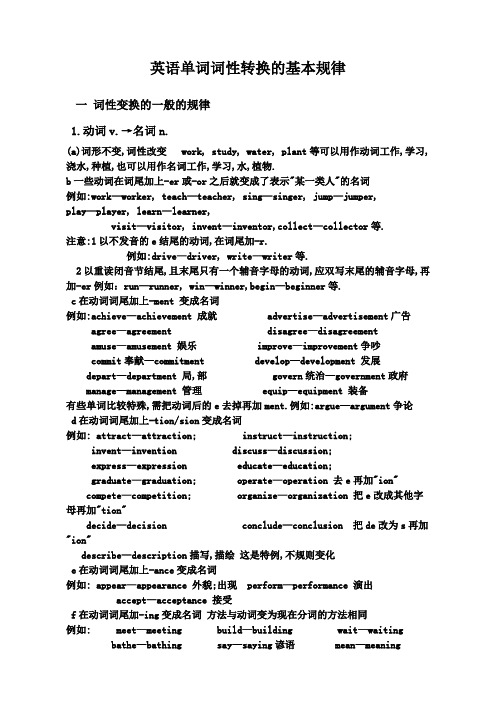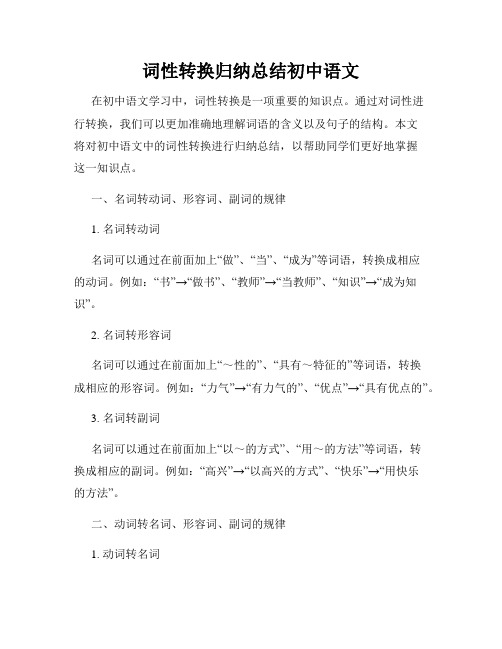(完整版)词性转换常见规律归纳
英语词性转换规则大全

英语词性转换规则大全(1)v.-n.动词转化为名词,post-postage mail-mailweigh-weight advise-advice(2)v.-n.-a.动词转化成名词-形容词act-actor / actress-activechange-change-changeable(3) v.-a.-ad.-n.动词转化成形容词,副词,名词fill-fullneed-necessary-necessarilyinterest(v. / n.) interested /interesting(4)n. a. n. a.名词转化为形容词person personal ( 个人的; 私人的)fun funny(5)n. pl. n. pl.名词转化为名词复数gentleman gentlemen human humans(6)a. ad. a. ad.形容词转化为副词possible possibly probable probably(7)a. ad. n.形容词转化为副词,名词true truly truthlucky luckily luck(8)原级比较级最高级far farther / further farthest / furthestlittle less least一、名词变为形容词的方法1. 在名词后面加-y可以变成形容词(尤其是一些与天气有关的名词)。
例如:rain—rainy, cloud—cloudy, wind—windy, snow—snowy, health—healthy, luck—lucky等。
注意:1)如果名词以重读闭音节结尾,且词尾只有一个辅音字母,这时应双写词尾的辅音字母再加-y。
如:sun—sunny, fun—funny等。
2)少数以不发音的e结尾的名词变为形容词时,应去掉e再加-y。
例如:noise—noisy, ice—icy 等。
2. 一些抽象名词在词尾加-ful可以变为形容词。
词性转换总结与归纳总结

词性转换总结与归纳总结词性转换是英语学习中的一个重要内容,它可以帮助我们拓展词汇量,丰富表达方式。
在这篇文章中,我将总结和归纳常见的词性转换规则,并给出一些示例,以帮助读者更好地理解和运用这些规则。
一、名词转动词名词转动词的常见方式有:加后缀、意义转换和词组转换。
1. 加后缀:- -ize、-ify:将名词转换为动词,并赋予“使……化”的含义。
例如:critic(评论家)→ criticize(批评)- -en:将名词转换为动词,并赋予“使……变得”的含义。
例如:deep(深度)→ deepen(加深)2. 意义转换:- 名词词义变动后,作为动词使用。
例如:experience(经验)→ experience(经历)3. 词组转换:- 名词+动词转换:名词作为动词使用。
例如:camera(相机)→ camera(拍照)二、动词转名词动词转名词的主要方式有:加后缀、意义转换和短语转换。
1. 加后缀:- -tion、-ation、-ment:将动词转换为名词,并赋予“……的行为、状态或结果”的含义。
例如:experience(经历)→ experience(经验)2. 意义转换:- 动词词义变动后,作为名词使用。
例如:swim(游泳)→ swim(游泳运动)3. 短语转换:- 动词+名词转换:动词作为名词使用。
例如:run(奔跑)→ run(竞选)三、形容词转副词形容词转副词的常见方式是:加后缀。
1. 加后缀:- -ly:将形容词转换为副词。
例如:quick(快速的)→ quickly(快速地)四、副词转形容词副词转形容词的方式主要是:移出后缀和意义转换。
1. 移出后缀:- 副词的-ly后缀去掉后,即变为形容词。
例如:beautifully(优美地)→ beautiful(美丽的)2. 意义转换:- 副词的词义变动后,作为形容词使用。
例如:fast(快速地)→ fast(快的)五、形容词转名词形容词转名词的方式主要是:加不定冠词或定冠词。
(完整版)高考英语备考词性转换之形容词和名词转换

高考英语备考词性转换之形容词和名词转换形容词和名词相互转化的一些规律及常见例词:1.英语中很多以—t直接结尾的形容词变名词时把-t变成 -ce。
常见例词:important —- importance different ——difference confident -— confidencepatient —— patience distant —- distance silent -- silence absent —- absence特例: difficult -- difficulty honest —— honesty frequent —— frequency urgent -- urgency2.有些名词加—y 变成形容词常见例词: rain —— rainy wind -— windy cloud —- cloudy sun -— sunny易混变化: health —- healthy wealth —- wealthy thirst -- thirsty luck —— luckytaste —— tasty noise -— noisy anger —— angry hunger -— hungry3.有些名词加—al 变成形容词常见例词:nation -— national education -— educational tradition -— traditionalemotion -- emotional intention ——intentional profession —- professional易错词:nature -— natural globe –– global4.有些名词加-ful变成形容词常见例词:care -- careful success––successful use —- useful power -- powerfulpeace —- peaceful wonder ——wonderful help —- helpful faith -— faithful thank -— thankful beauty—— beautiful meaning -— meaningful5.个别名词加—ous 变成形容词常见例词: danger —— dangerous courage -— courageous humor -- humorousfame —- famous6.有些名词加—ly变成成形容词常见例词: day -— daily month —- monthly week -- weekly year —- yearlyfriend -— friendly order -- orderly time —- timely love -- lovely7.有些名词加—ish变成形容词常见例词:fool —— foolish self —— selfish boy -— boyishchild -- childish8.有些动词加 -able 变成形容词常见例词: rely —— reliable comfort —- comfortable value —— valuableadvise -— advisable accept -- acceptable access -- accessible一些没有规律的名词和形容词转化词:benefit —— beneficial face —— facial freedom -—free wisdom -- wisecuriosity -- curious safety -- safe warmth —— warm truth —— truedepth -— deep length —— long poverty —— poor bravery —— braveshortage-- short pride -— proud energy -— energetic reward —- rewardingambition —- ambitious caution —-cautious talent —- talented gift —— giftedtruth – true pride – proud 等。
英语单词词性转换的基本规律

英语单词词性转换的基本规律一词性变换的一般的规律1.动词v.→名词n.(a)词形不变,词性改变 work, study, water, plant等可以用作动词工作,学习,浇水,种植,也可以用作名词工作,学习,水,植物.b一些动词在词尾加上-er或-or之后就变成了表示"某一类人"的名词例如:work—worker, teach—teacher, sing—singer, jump—jumper,play—player, learn—learner,visit—visitor, invent—inventor,collect—collector等.注意:1以不发音的e结尾的动词,在词尾加-r.例如:drive—driver, write—writer等.2以重读闭音节结尾,且末尾只有一个辅音字母的动词,应双写末尾的辅音字母,再加-er例如:run—runner, win—winner,begin—beginner等.c在动词词尾加上-ment 变成名词例如:achieve—achievement 成就 advertise—advertisement广告agree—agreement disagree—disagreementamuse—amusement 娱乐 improve—improvement争吵commit奉献—commitment develop—development 发展depart—department 局,部 govern统治—government政府manage—management 管理 equip—equipment 装备有些单词比较特殊,需把动词后的e去掉再加ment.例如:argue—argument争论d在动词词尾加上-tion/sion变成名词例如: attract—attraction; instruct—instruction;invent—invention discuss—discussion;express—expression educate—education;graduate—graduation; operate—operation 去e再加"ion"compete—competition; organize—organization 把e改成其他字母再加"tion"decide—decision conclude—conclusion 把de改为s再加"ion"describe—description描写,描绘这是特例,不规则变化e在动词词尾加上-ance变成名词例如: appear—appearance 外貌;出现 perform—performance 演出accept—acceptance 接受f在动词词尾加-ing变成名词方法与动词变为现在分词的方法相同例如: meet—meeting build—building wait—waiting bathe—bathing say—saying谚语 mean—meaningend —ending train —training wash—washing 注意:以重读闭音节结尾,且末尾只有一个辅音字母的动词,应双写末尾的辅音字母,再加-ing如:swim—swimming shop—shopping begin—beginningg其他一些比较特殊的变化例如: Beg乞讨—beggar乞丐 behave行为举止—behaviorknow知道—knowledge知识 fly—flight 飞行heat 加热—heat热量 hit 撞击—hit 轰动一时的人或物,碰撞mix 混合—mixture混合物 press按,压—pressure压力sit坐—seat 座位 succeed—success成功tour—tour旅游/ tourist 游客2.动词v.→形容词adj.a动词后面加able,以e结尾的动词则去e加able,表示具有此性质,特点或属性.例如: afford-affordable;love-lovableb动词后面加ed,以e结尾的动词则直接加d,表示被动性的属性或特点.例如: scatter-scattered use-usedc不规则的动词则必须记忆,记住其过去分词形式.规律不大,意义同b.3.名词n.→形容词adj.a在名词后面加-y可以变成形容词尤其是一些与天气有关的名词例如: rain—rainy, cloud—cloudy, wind—windy, snow—snowy,health—healthy, luck—lucky,anger—angry guilt—guilty内疚的 tourist—touristy游客多的 , salt 盐—salty 咸的silk丝绸—silky丝绸般的, sleep—sleepy 昏昏欲睡的注意:1如果以重读闭音节结尾,且词尾只有一个辅音字母,这时应双写辅音字母再加"-y". 如: sun—sunny, fun—funny, fog—foggy有雾的, fur—furry毛皮的2少数以不发音的e结尾的名词变为形容词时,应去掉e再加"-y".如: noise—noisy, ice—icy, shine—shiny发亮的, taste口味—tasty甜的b名词后面加-ed,以e结尾的直接加d.例如: spot斑点—spotted有斑点的; talent—talented 有天赋的organize—organized 有组织的; balance—balanced平衡的c一些抽象名词在词尾加-ful可以变为形容词例如:care—careful, thank—thankful, help—helpful,use—useful, meaning—meaningfuld在名词后加-less构成含有否定意义的形容词例如:care—careless粗心的, use—useless无用的hope—hopeless没希望的,home—homeless无家可归的e一些以-ce结尾的名词,把-ce改为-t变成形容词例如: difference—different, silence—silent, confidence—confidentf.在名词后加-ly变为形容词例如: friend—friendly, love—lovely, live---livelyg.在名词后加-ous变为形容词例如: danger—dangeroush名词后面加-al变为形容词例如: music—musical; medicine—medical 这个比较特殊i名词后面加-able变为形容词,如果以e结尾就去e再加"-able".例如: adjust—adjustable 可调整的 value—valuable有价值的j名词后面加-en变成形容词例如: wood—wooden 木制的 wool—woolen 羊毛的k一些表示国家的名词可以在词尾加-ese, -ish或-n构成表示国籍,语言的形容词例如:China—Chinese, Japan—Japanese, England—English,America—American, India—Indian, Australia —Australian 注意Canada—Canadian4.形容词adj.→副词adv.▲一般在形容词的词尾加-ly可以变成副词例如: quick—quickly, slow—slowly, loud—loudly, sudden—suddenly 等但是,以下几点值得注意:a 一些以"辅音字母+y"结尾的形容词,要把y改为i再加-ly例如: happy—happily, angry—angrily, lucky—luckily, heavy—heavily, noisy—noisilyb 有些以-ble或-le结尾的形容词,去掉e加-y例如:possible—possibly, terrible—terriblyc少数以e结尾的形容词,要去掉e再加-ly例如: true—truly但绝大多数以e结尾的形容词仍然直接加-ly 例如: polite—politely, wide—widelyd以-l结尾的形容词变为副词时要在词尾加-ly,以-ll结尾的才在词尾只加-y.例如: usual—usually, careful—carefully, useful—usefullyfull—fully 以-ll结尾的才只加y二 . 派生:指由一个词根加上前缀和或后缀构成另一个词的构词形式;1. 前缀:一般而言,前缀只改变词的含意,并不改变词的词性,有些前缀如en- , under- 等却使原词改变了词性,如 force n 力量— enforce v 加强;rich adj 富有—enrich v 使富裕;line n 线—underline v 在……之下画线;①表示否定意义的前缀,往往使原词变成它的反义词;前缀含义词根派生词dis- 不 like 喜欢 dislike 不喜欢un- 不 fair 公平 unfair 不公平il- 不;无 legal 合法的 illegal 非法的in- 不;非 correct 正确的 incorrect 不正确的im- 非 possible 可能的 impossible 不可能的ir- 不;非 regular 规则的 irregular 不规则的non- 无;非 smoker 烟民 non-smoker 不吸烟者en- 使 courage 勇气 encourage 鼓励fore- 前;预先 head 头 forehead 前额inter- 在……之间 national 国家的 international 国际的kilo- 千 meter 米 kilometer 千米micro- 微量的;微小的computer 计算机 microcomputer 微机mid- 在…中间 autumn 秋天 mid-autumn 中秋mis- 错误地 understand 理解 misunderstand 误解over- 在…上,过分;超过 head 头 overhead 在头顶上的re- 再;重;又 build 修建 rebuild 重建seimi- 半 circle 圆 semicircle 半圆2. 后缀:通常情况下,后缀不但改变词,还改变词性,常见的后缀有动词后缀、副词后缀、形容词后缀和名词后缀;①动词后缀:后缀含义词根派生词-en 变得… wide 宽的 widen 加宽;变宽-ify 使… beauty 美 beautify 使漂亮-ize/ise 使… real的 realize 实现②副词后缀:后缀含义词根派生词-ly 在…状态中 happy 高兴;幸福 happily 高兴地;幸福地-ward 朝…方向/地方 back 后 backward 向后;朝后③形容词后缀:后缀含义词根派生词-able/-ible 可…的;能…的 comfort 舒服 comfortable 舒适的-al/-ial 属于…的;有…特点 practice 练习 practical 实际的;可行的-ed 有…特性的 interest 兴趣 interested 感兴趣的-ful 充满…的 harm 伤害;损伤 harmful 有害的;致伤的-ish 有…属性的 self 自己 selfish 自私的-ive 有…倾向的 create 创造 creative 创造性的④名词后缀:后缀含义词根派生词-ance/-ence 指行为、状态 perform 表演 performance 演出;表演-dom 指性质、状态 free 自由的 freedom 自由-er/or 指人的身份 work 工作 worker 工人-ess 指人的身份 host 招待;主持 hostess 女主人-ese 表示国籍 China 中国 Chinese 中国人-ian 指人的身份 music 音乐 musician 音乐家-ism 与主义有关的 social 社会的 socialism 社会主义。
词性转换归纳总结初中语文

词性转换归纳总结初中语文在初中语文学习中,词性转换是一项重要的知识点。
通过对词性进行转换,我们可以更加准确地理解词语的含义以及句子的结构。
本文将对初中语文中的词性转换进行归纳总结,以帮助同学们更好地掌握这一知识点。
一、名词转动词、形容词、副词的规律1. 名词转动词名词可以通过在前面加上“做”、“当”、“成为”等词语,转换成相应的动词。
例如:“书”→“做书”、“教师”→“当教师”、“知识”→“成为知识”。
2. 名词转形容词名词可以通过在前面加上“~性的”、“具有~特征的”等词语,转换成相应的形容词。
例如:“力气”→“有力气的”、“优点”→“具有优点的”。
3. 名词转副词名词可以通过在前面加上“以~的方式”、“用~的方法”等词语,转换成相应的副词。
例如:“高兴”→“以高兴的方式”、“快乐”→“用快乐的方法”。
二、动词转名词、形容词、副词的规律1. 动词转名词动词可以通过在后面加上“~的人”、“~的地方”等词语,转换成相应的名词。
例如:“读书”→“读书的人”、“写字”→“写字的地方”。
2. 动词转形容词动词可以通过在后面加上“~的”、“具有~特征的”等词语,转换成相应的形容词。
例如:“忍受”→“能忍受的”、“感动”→“具有感动特征的”。
3. 动词转副词动词可以通过在后面加上“以~的方式”、“用~的方法”等词语,转换成相应的副词。
例如:“高兴”→“以高兴的方式”、“快乐”→“用快乐的方法”。
三、形容词转名词、动词、副词的规律1. 形容词转名词形容词可以通过在后面加上“~的人”、“~的对象”等词语,转换成相应的名词。
例如:“聪明”→“聪明的人”、“美丽”→“美丽的对象”。
2. 形容词转动词形容词可以通过在前面加上“使得”、“让”、“将”等词语,转换成相应的动词。
例如:“干净”→“使得干净”、“光滑”→“让光滑”。
3. 形容词转副词形容词可以通过在后面加上“以~的方式”、“用~的方法”等词语,转换成相应的副词。
高考英语词性转换知识点精编版

高考英语词性转换知识点精编版1.名词转动词名词转动词的方法一般有以下几种:1) 加-ing:常见的词性转换方式就是将名词加上-ing后即可转换为动词,表示正在进行的动作或状态。
例如:truth(名词,真理)→truth-ing(动词,查找真相)2) 加-ize或-ify:有些名词在转换为动词时需要添加-ize或-ify 后缀。
例如:apology(名词,道歉)→apologize(动词,道歉);beauty(名词,美丽)→beautify(动词,美化)3) 加-ize变化:有些名词转动词时直接加-ize后缀。
例如:organize(名词,组织)→organize(动词,组织)2.形容词转副词形容词转副词的方法一般有以下几种:1) 加-ly:常见的词性转换方式就是将形容词加上-ly后即可转换为副词。
例如:quick(形容词,快的)→quickly(副词,快速地)2) 不加后缀:有些形容词可以直接转换为副词,不需要添加后缀。
例如:fast(形容词,快的)→fast(副词,快速地)3.动词转名词动词转名词的方法一般有以下几种:1) 加-ing:常见的词性转换方式就是将动词加上-ing后即可转换为名词,表示该动作的状态或结果。
例如:paint(动词,绘画)→painting(名词,绘画)2) 加-er:有些动词转换为名词时需要添加-er后缀,表示该动词的展现者或从事者。
例如:teach(动词,教)→teacher(名词,教师)3) 加-ion或-ment:有些动词转换为名词时需要添加-ion或-ment后缀。
例如:inform(动词,通知)→information(名词,信息)4.形容词转名词形容词转名词的方法一般有以下几种:1) 加-ness:常见的词性转换方式就是将形容词加上-ness后即可转换为名词,表示该形容词的性质或状态。
例如:kind(形容词,友善的)→kindness(名词,友善)2) 不加后缀:有些形容词可以直接转换为名词,不需要添加后缀。
词性转换规律
词性转换规律3)以辅音字母+y结尾的名词,变y为i,再加-es。
如:baby—babies;city—cities;4)以o结尾的名词,大部分加-s,少数加-es。
如:photo—photos;potato—potatoes;5)以f或fe结尾的名词,变f或fe为v,再加-es。
如:knife—knives;life—lives;6)以元音字母+y结尾的名词,直接加-s。
如:boy—boys;day—days。
2、不规则变化1)一些名词的单复数形式完全不同,需要记忆。
如:man—men;woman—women;child—children;tooth—teeth;foot—feet;2)一些名词的复数形式与单数形式相同。
如:sheep—sheep;deer—deer;fish—fish;3)一些名词的复数形式只有复数,没有单数。
如:scissors—scissors;pants—pants;4)一些名词的复数形式可以用-s或-es。
如:hero—heroes;potato—potatoes。
3、特殊情况1)有些名词的复数形式有两种,但含义不同。
如:brother—brothers(兄弟),brethren(同教会的);die—dies (模具),dice(骰子);2)有些名词的复数形式有两种,但用法不同。
如:XXX(衣服)在表示“一件衣服”时,是不可数名词,没有复数形式;但在表示“衣服”时,是可数名词,有复数形式。
To form XXX + y。
change y to i and add es。
For example。
baby es babies。
city es cities。
and family es families.To form the plural of words ending in f or fe。
change f or fe to ves。
For example。
XXX。
XXX。
(完整word版)英语词性转换规则大全,推荐文档
英语词性转换规则大全(1)v.-n.动词转化为名词,post-postage mail-mailweigh-weight advise-advice(2)v.-n.-a.动词转化成名词-形容词act-actor / actress-activechange-change-changeable(3) v.-a.-ad.-n.动词转化成形容词,副词,名词fill-fullneed-necessary-necessarilyinterest(v. / n.) interested /interesting(4)n. a. n. a.名词转化为形容词person personal ( 个人的; 私人的)fun funny(5)n. pl. n. pl.名词转化为名词复数gentleman gentlemen human humans(6)a. ad. a. ad.形容词转化为副词possible possibly probable probably(7)a. ad. n.形容词转化为副词,名词true truly truthlucky luckily luck(8)原级比较级最高级far farther / further farthest / furthestlittle less least一、名词变为形容词的方法1. 在名词后面加-y可以变成形容词(尤其是一些与天气有关的名词)。
例如:rain—rainy, cloud—cloudy, wind—windy, snow—snowy, health—healthy, luck—lucky等。
注意:1)如果名词以重读闭音节结尾,且词尾只有一个辅音字母,这时应双写词尾的辅音字母再加-y。
如:sun—sunny, fun—funny等。
2)少数以不发音的e结尾的名词变为形容词时,应去掉e再加-y。
例如:noise—noisy, ice—icy 等。
2. 一些抽象名词在词尾加-ful可以变为形容词。
英语单词词性转换的基本规律
英语单词词性转换的基本规律一词性变换的一般的规律1.动词(v.)→名词(n.)(a)词形不变,词性改变work, study, water, plant等可以用作动词(工作,学习,浇水,种植),也可以用作名词(工作,学习,水,植物).(b)一些动词在词尾加上-er或-or之后就变成了表示"某一类人"的名词例如:work—worker, teach—teacher, sing—singer, jump—jumper, play—player, learn—learner, visit—visitor, invent—inventor,collect—collector等.注意:1)以不发音的e结尾的动词,在词尾加-r.例如:drive—driver, write—writer等.2)以重读闭音节结尾,且末尾只有一个辅音字母的动词,应双写末尾的辅音字母,再加-er例如:run—runner, win—winner,begin—beginner等.(c)在动词词尾加上-ment 变成名词例如:achieve—achievement (成就) advertise—advertisement(广告) agree—agreement disagree—disagreementamuse—amusement (娱乐) improve—improvement(争吵)commit(奉献)—commitment develop—development (发展)depart—department (局,部) govern(统治)—government(政府)manage—management (管理) equip—equipment (装备)有些单词比较特殊,需把动词后的e去掉再加ment.例如:argue—argument(争论)(d)在动词词尾加上-(t)ion/(s)ion变成名词例如: attract—attraction; instruct—instruction;invent—invention discuss—discussion;express—expression educate—education;graduate—graduation; operate—operation (去e再加"ion")compete—competition; organize—organization (把e改成其他字母再加"tion") decide—decision conclude—conclusion (把de改为s再加"ion")describe—description描写,描绘(这是特例,不规则变化)(e)在动词词尾加上-ance变成名词例如: appear—appearance (外貌;出现) perform—performance (演出)accept—acceptance (接受)(f)在动词词尾加-ing变成名词(方法与动词变为现在分词的方法相同)例如: meet—meeting build—building wait—waitingbathe—bathing say—saying(谚语) mean—meaningend —ending train —training wash—washing注意:以重读闭音节结尾,且末尾只有一个辅音字母的动词,应双写末尾的辅音字母,再加-ing如:swim—swimming shop—shopping begin—beginning(g)其他一些比较特殊的变化例如: Beg(乞讨)—beggar(乞丐) behave(行为举止)—behaviorknow(知道)—knowledge(知识) fly—flight (飞行)heat (加热)—heat(热量) hit (撞击)—hit( 轰动一时的人或物,碰撞)mix (混合)—mixture(混合物) press(按,压)—pressure(压力)sit(坐)—seat (座位) succeed—success(成功)tour—tour(旅游)/ tourist (游客)2.动词(v.)→形容词(adj.)(a)动词后面加able,以e结尾的动词则去e加able,表示具有此性质,特点或属性.例如: afford-affordable;love-lovable(b)动词后面加ed,以e结尾的动词则直接加d,表示被动性的属性或特点.例如: scatter-scattered use-used(c)不规则的动词则必须记忆,记住其过去分词形式.规律不大,意义同(b).3.名词(n.)→形容词(adj.)(a)在名词后面加-y可以变成形容词(尤其是一些与天气有关的名词)例如: rain—rainy, cloud—cloudy, wind—windy, snow—snowy,health—healthy, luck—lucky,anger—angry guilt—guilty(内疚的)tourist—touristy(游客多的) , salt (盐)—salty (咸的)silk(丝绸)—silky(丝绸般的), sleep—sleepy (昏昏欲睡的)注意:1)如果以重读闭音节结尾,且词尾只有一个辅音字母,这时应双写辅音字母再加"-y". 如: sun —sunny, fun—funny, fog—foggy(有雾的), fur—furry(毛皮的)2)少数以不发音的e结尾的名词变为形容词时,应去掉e再加"-y".如: noise—noisy, ice—icy, shine—shiny(发亮的), taste(口味)—tasty(甜的)(b)名词后面加-ed,以e结尾的直接加d.例如: spot(斑点)—spotted(有斑点的); talent—talented (有天赋的)organize—organized 有组织的; balance—balanced(平衡的)(c)一些抽象名词在词尾加-ful可以变为形容词例如:care—careful, thank—thankful, help—helpful,use—useful, meaning—meaningful(d)在名词后加-less构成含有否定意义的形容词例如:care—careless(粗心的), use—useless(无用的)hope—hopeless(没希望的),home—homeless(无家可归的)(e)一些以-ce结尾的名词,把-ce改为-t变成形容词例如: difference—different, silence—silent, confidence—confident(f).在名词后加-ly变为形容词例如: friend—friendly, love—lovely, live---lively(g).在名词后加-ous变为形容词例如: danger—dangerous(h)名词后面加-al变为形容词例如: music—musical; medicine—medical (这个比较特殊)(i)名词后面加-able变为形容词,如果以e结尾就去e再加"-able".例如: adjust—adjustable 可调整的value—valuable有价值的(j)名词后面加-en变成形容词例如: wood—wooden 木制的wool—woolen 羊毛的(k)一些表示国家的名词可以在词尾加-ese, -ish或-n构成表示国籍,语言的形容词例如:China—Chinese, Japan—Japanese, England—English,America—American, India—Indian, Australia —Australian (注意Canada—Canadian)4.形容词(adj.)→副词(adv.)▲一般在形容词的词尾加-ly可以变成副词例如: quick—quickly, slow—slowly, loud—loudly, sudden—suddenly 等但是,以下几点值得注意:(a) 一些以"辅音字母+y"结尾的形容词,要把y改为i再加-ly例如: happy—happily, angry—angrily, lucky—luckily, heavy—heavily, noisy—noisily(b) 有些以-ble或-le结尾的形容词,去掉e加-y例如:possible—possibly, terrible—terribly(c)少数以e结尾的形容词,要去掉e再加-ly例如: true—truly但绝大多数以e结尾的形容词仍然直接加-ly 例如: polite—politely, wide—widely(d)以-l结尾的形容词变为副词时要在词尾加-ly,以-ll结尾的才在词尾只加-y.例如: usual—usually, careful—carefully, useful—usefullyfull—fully (以-ll结尾的才只加y)二. 派生:指由一个词根加上前缀和(或)后缀构成另一个词的构词形式。
词性转换规律
英语单词词性转换的基本规律一、动词变名词①词形不变,词性改变。
例如:work, study, water, plant等可以用作动词,也可以用作名词。
②一些动词在词尾加上-er或-or之后就变成了表示"某一类人"的名词。
注意:1)以不发音的e结尾的动词,在词尾加-r。
例如:drive—driver, write—writer等。
2)以重读闭音节结尾,且末尾只有一个辅音字母的动词,应双写末尾的辅音字母,再加-er。
例如:run—runner, win—winner,begin—beginner等。
work—worker teach—teacher sing—singer jump—jumper play—player learn—learner visit—visitor invent—inventorwait _ waiterfind _ finderthrill _ thrillerwrite _ writerdrive _ drivercome _ comerexplore _ explorerdance _ dancerrun _ runnerwin _ winnerrob _ robber③在动词词尾加ing变成名词注意:方法与动词变为现在分词的方法相同例如:meet—meeting, build—building, swim—swimming shop—shopping begin—beginning wash—washing draw ----drawing end ---ending begin ---beginning skate--- skating feel---- feeling say---saying, mean ----meaning, cross---- crossing surf ----surfing paint -----painting wait—waiting④在动词词尾加上ment 变成名词例如:achieve—achievement (成就) agree—agreement ⑤在词尾加ion 或去e加ion:decide _ decision donate _ donation describe _ description produce _ production celebrate _ celebration pronounce _ pronunciationdecorate _ decorationgraduate _ graduationfrustrate - frustrationpollute _ pollutioncontribute _ contributioncongratulate _congratulationeducate _ educationappreciate _ appreciation operate _ operation invite _ invitationdiscuss _ discussioninvent _ inventionattract _ attraction⑥其他一些比较特殊的变化know ---- knowledge please ---pleasure enjoy--- enjoyment practise--- practice die ---death succeed--- success weigh ---weight sit-- seatchange --chance enter --entrancefly --flightdiscover-- discovery appear-- appearance breathe-- breath二、名词变形容词①在名词后面加-y可以变成形容词(尤其是一些与天气有关的名词)例如: rain—rainy, cloud—cloudy, salt —salty sleep—sleepy注意:1)如果以重读闭音节结尾,且词尾只有一个辅音字母,这时应双写辅音字母再加"-y".如: sun—sunny, fun—funny, fog—foggy2)少数以不发音的e结尾的名词变为形容词时,应去掉e再加"-y".如: noise—noisy, ice—icy②名词后面加-ed,以e结尾的直接加d,表示被动性的属性或特点.talent—talented (有天赋的) use-usedplease - pleasedunite - unitedexcite - excitedclose - closedrelax - relaxed surprise - surprised, develop - developed interest - interested crowd - crowded pollute - polluted③一些抽象名词在词尾加-ful可以变为形容词use - useful care - careful, help - helpful, thank - thankful peace - peaceful, forget - forgetful, play - playful, succeed - successful, wonder - wonderful④在名词后加-less构成含有否定意义的形容词例如:care—careless, use—uselesshope—hopeless,home—homeless⑤一些以-ce结尾的名词,把-ce改为-t变成形容词例如: difference—different, silence—silent, confidence—confident ⑥在名词后加-ly变为形容词例如: friend—friendly, love—lovely, live---lively⑦在名词后加-ous变为形容词例如: danger—dangerous humor—humorous⑧名词后面加-al变为形容词例如: music—musical; medicine—medical (这个比较特殊) educate - educational ⑨名词后面加-able变为形容词,如果以e结尾就去e再加"-able".例如: adjust—adjustable 可调整的value—valuable有价值的know - knowledgeable, enjoy - enjoyabe, suit - suitableadjust - adjustable, comfort - comfortable⑩名词后面加-en变成形容词例如: wood—wooden 木制的wool—woolen 羊毛的speak - spoken, break - broken⑪一些表示国家的名词可以在词尾加-ese, -ish或-n构成表示国籍,语言的形容词例如:China—Chinese, England—English,America—American, Australia —Australian(注意Canada—Canadian)⑫其它:lose - lost,fool - foolish,live - lively / alive /living, sleep - sleepy / sleeping / asleep, wake - awake, taste - tastydie - dead,world - worldwide。
- 1、下载文档前请自行甄别文档内容的完整性,平台不提供额外的编辑、内容补充、找答案等附加服务。
- 2、"仅部分预览"的文档,不可在线预览部分如存在完整性等问题,可反馈申请退款(可完整预览的文档不适用该条件!)。
- 3、如文档侵犯您的权益,请联系客服反馈,我们会尽快为您处理(人工客服工作时间:9:00-18:30)。
动词变名词1. v+ ment 结尾achieve---achievement 成就advertise---advertisement advertising agree—agreement argue---argument争吵announce --- announcement通知amuse--- amusement 娱乐2.V+ tion commit 奉献—commitment develop---development disgree—disagreement equip 装备---equipment 装备,器材govern 统治—government 政府manage---management经营管理settle--- settlement 定居admit 承认—admissioncompete—competition 竞争,比赛discuss—discussion 讨论educate ---- educationdecide --- decisiondescribe—description 描写,描绘organize --- organization imagine—imagination 想象力introduce—introduction 介绍instruct—instruction 指导,介绍invent—inventor / invention illustrate 阐明,举例说明3.V+ ance 结尾allow —allowance 允许appear—appearance 外貌,出现4.V+ ing 结尾bathe 洗澡---bathing end 结束ending 结尾,结局train 训练---training 5.V+ 其他beg(乞讨)—beggar 乞丐inspire---inspiration 灵感,鼓舞人心的pollute -- pollution 污染predict---prediction 预言pronounce ---pronunciation resolve 决心------- resolution 决心impress 给人印象—impression 印象permit 允许 - permissionsuggest-建议,暗示--suggestion solve 解决- s olution 解决方法perform --- performance 演出exist—existance 存在mean --- meaning 意义say ---- s aying 谚语结尾以t, te, de, 结尾的动词常去 E 或直接加ion attract吸引—attraction 有吸引力的事或人;令人向往的地方conclude—conclusion 结论--illustrationinvite —invitationsit--seat 座位employ--employer 雇主,老板believe—belief 信仰behave 行为,举止 -------- behavior know---knowledge fly —flight 飞行heat 加热---heat 热量hit 撞击 ------- h it 轰动一时的人或物,碰撞mix 混合mixture 混合物press 按,压—pressure 压力receive—receptionist 接待员serve—service 服务名词变形容词1 名词+y anger 生气angryhonest—honesty 诚实的hunger---hungry fog—foggy 有雾的fur furry 毛皮的guilt 罪恶---guilty 内疚的health---healthy luck---lucky cloud---cloudy wind—windy2. ------------------------ 名词+ ed balance –balanced 平衡的spot 斑点,地点 ---- spotted 有斑点的talent ---- talented 有天赋的organized 有组织的3.名词+ ful/less meaning—meaningful 有意义的care—careful/ careless 小心的;--employee 雇员succeed-- success tour 在 -- 旅游- tourist 游客pursue—pursuit 追求,从事propose—proposal 建议withdraw —withdrawal 取钱;收回;撤退survive—survival--survivor 幸存者arrive-- arrival 到达analyze—analysis 分析rain---rainy snow---snowy sun—sunny tourist touristy 游客多的business---busy salt 盐--- salty 咸的shine---shiny 发亮的silk 丝绸—silky 丝绸般的sleep---sleepy 昏昏欲睡的taste 口味,品味----------------- tasty 甜的distusted 厌恶的offended 生气的crowded 拥挤的polluted 被污染的pleased 高兴的粗心的help---helpful / helplesshome—homeless 无家可归的colour---colourful pain 疼痛---painful 痛苦的use---useless/ useful 4.名词+ able adjustable 可调整的comfort---comfortable 5. ---------------------- 名词+ ouscourage—courageous 勇敢的danger—dangerous mystery 神秘 ----------- mysterious 神秘的6. --------------- ce 变t confidence------------------ confidentdifference---different7. al 结尾Addition —additional 附加的,额外的Class—classical 经典的medicine 药medical 医学的music---musical nature---natural 自然的person---personal (私人的) nation—national 国家的8.名词+ ly friend—friendly live---lively 活跃的,有生气的love—lovely 可爱的10. 其他energy精力---energetic strategy—strategic 战略的fool 傻子—foolish 愚蠢的freedom 自由—free 空的,免费thank—thankful 充满感激的peace 和平-- peaceful 平静的,宁静的playful 顽皮的,爱玩耍的knowledge---knowledgeablesuit 一套- suitable 合适的dependence—dependent independence--independenteducation---educational 有教育意义的tradition --- t raditional 传统的origin 起源---original 新颖的;独创的grammar—grammatical 语法的globe—global 全球的9.+ en 结尾wood—wooden 木制的wool —woolen 羊毛的的height 高度—high illness 疾病--- ill love—loving 慈爱的death---deadpleasure---pleasant / pleased popularity 流行性—popular形容词变副词1.形容词+ ly bad—badly bright—brightly 明亮地casual—casually 随意地clear—clearly 清楚地complete—completely 完全correct---correctly 正确地final--finally fortunate—fortunately 幸运地general—generally 一般来讲loud—loudly particular 特殊的,独特的—particularly polite—politelyproper 合适的- ,恰当的---properlymain ----- mainly 主要地2. 以le 结尾的去 e + y comfortable---comfortably gentle—gently possible---possibly3. 辅音字母+ y 变ily easy—easily heavy—heavily happy--happily4. 特殊pride---proudscientist --- s cientific 科学的most 多数-- mostly 多半,大多数normal---normally 正常地quick—quickly quiet—quietly 轻轻地,安静地real—really recent 最近的------------- recently 最近;近来hard 难的;努力地---hardly 几乎不late 迟的—lately 最近;近来sad--sadlyslow---slowly special—specially 专门,特殊地specific---specifically 特定地,明确地strong—strongly 坚决地,强烈地sudden—suddenly 突然usual—usuallysimple ---- simply 仅仅;只;简单地terrible---terribly形容词变名词efficient 有效率的—efficiency 效率patient—patience/impatience true—truth high—height possible—possibility responsible—responsibility prosperous—prosperity 繁荣形容词变动词modern—modernize fast--fasten long—lengthen—length(n.) less--lessen strong—strengthen—strength(n.) large—enlargegood—well 好地true—trulywell 身体健康的,井名词变动词computer--computerize 名词---形容词—副词beauty 美,美人—beautiful —beautifully care—careful—carefully care—careless—carelessly difference---different---differently fortune—fortunate—fortunately/u nfortunately happiness—happy—happily hunger—hungry--hungrily health—healthy—healthily luck—lucky—luckily 方位的词名词—形容词East—easterndependen—t dependenc依赖性independent—independency 独立性wide—widthlong—length urgent—urgency 紧急accurate—accuracy 准确性social--socializeshort/shorten wide--widen noise—noisy—noisily pride—proud—proudly 骄傲地sadness—sad—sadly safety 安全;安全的地方—safe —safely silence—silent---silently 默默地success—successfu—l successfully truth—true—truly unluck—unlucky—unluckily wonder 奇迹—wonderful —wonderfullyWest—westernSouth—southern In the west of ChinaNorth---northern In the western part of China 四大洲名词 - 形容词Asia 亚洲–AsianAfrica 非洲-- AfricanEurope欧洲-- EuropeanAmerica 美洲- American既是形容词又是副词earlyget up early ;an early trainlate be late for class come late forschooldeep dive deep into the sea a holedeep largehigh jump high ;a high mountainhard a hard question; a hardstone work hard / study hardrain hardlongIt takes too longIt takes a long timefarjump farMy home is far from schoolstraight a straight linego straight along here。
